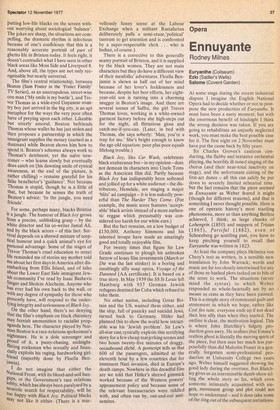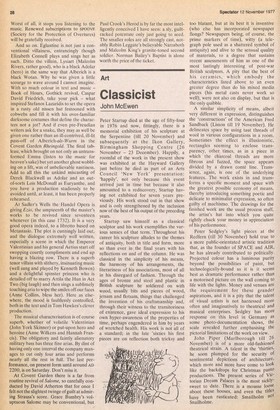Opera
Ennuyante
Rodney Mines
Euryanthe (Coliseum) Ezio (Sadler's Wells) Salome (Covent Garden) At some stage during the recent industrial dispute I imagine the English National Opera had to decide whether or not to postpone the new production of Euryanthe. it must have been a nasty moment, but with the enormous benefit of hindsight I think the wrong decision was taken. If you are going to rehabilitate an unjustly neglected work, you must make the best possible case for it. The first night on 2 November must have put the cause back by fifty years.
Sir Charles Groves's cautious conducting, the flabby and tentative orchestral playing, the horribly ill-tuned singing of the chorus (and their near-total inactivity on stage), and the unfortunate cutting of the first-act dance — all this can safely be put down to severely limited rehearsal time. but the fact remains that the piece seemed as Ennuyante as Weber feared it might (though for different reasons), and that is something I never thought possible. Here is one of operatic history's most startling phenomena, more so than anything Berlioz achieved, I think; as large chunks of Lohengrin (1850) and snippets of Tristan (1865), Parsifal (1882), even of Schoenberg go scuttling past, you have to keep pinching yourself to recall that Euryanthe was written in 1823.
At least the company plays Helmina von Chezy's text as written, in a sensible new translation by John Warrack; words and music are far too closely intertwined for any of those re-hashed plots tacked on to bits of the score to work. The situations (never mind the syntax) to which Weber responded so whole-heartedly are by no means as crass as they have been painted. This is a simple story of communal guilt and atonement in which we hope, rather like Cost fan tutte, everyone ends up if not dead then less silly than when they started. The outline is clear, the motivation logical. This is where John Blatchley's fidgety production goes awry. He realises Oat Emma's restless ghost is literally the moving spirit of the piece, but then uses her much less purposefully than did Malcolm Fraser in a generally forgotten semi-professional production at University College two years ago. Weber himself suggested showing the good lady during the overture. But Blatchley gives us an interminable dumb-show tel ling the whole story so far, which even someone intimately acquainted with sin gers, movement group and plot could not hope to understand — and it does take some of the zing out of the subsequent narrations. Worst of all, it stops you listening to the music. Renewed subscriptions to SPOOVE (Society for the Protection of Overtures) will be gratefully received.
And so on. Eglantine is not just a conventional villainess, entrancingly though Elizabeth Connell plays and sings her as such. Ditto the villain, Lysiart (Malcolm Rivers, rather good), who is a black Adolar (hero) in the same way that Alberich is a black Wotan. Why he was given a little scourge to wave around I cannot imagine. With so much colour in text and music — Book of Hours, Gothick revival, Caspar David Friedrich, take your pick — what inspired Stefanos Lazaridis to set the opera in a rusty old nissen hut festooned with cobwebs and fill it with his over-familiar darksome costumes that define the characters not a jot? And if even pre-Freudian writers ask for a snake, they may as well be given one rather than an ill-contrived, ill-lit pass-off of Alberich-Ws-Werra in the Covent Garden Rheingold. The final tableau, which brought on not only an untransformed Emma (listen to the music for heaven's sake) but yet another ghost wobbling on a lift, was of unbelievable nastiness. Add to all this the unkind miscasting of Derek Blackwell as Adolar and an outof-sorts Lois McDonal] as Euryanthe, and you have a production studiously to be avoided until, at least, it has been properly rehearsed.
At Sadler's Wells the Handel Opera is giving Ezio, the umpteenth of the master's works to be revived since seventeen whenever (in this case 1732). It is a very good opera indeed, to a libretto based on Metastasio. The plot is cunningly laid out, and the dialogue extremely well written, especially a scene in which the Emperor Valentinian and his general Aetius start off swopping courtly compliments and end up having a blazing row. There is a superb tenor villain with slithery, insinuating music (well sung and played by Kenneth Bowen) and a delightful spinster princess who is detailed off to marry Attila the Hun in Act Two (big laugh) and then sings a sublimely touching aria to wipe the smiles off our faces (Anne Collins, bless her). Here as elsewhere, the mood is faultlessly controlled, ' both in the text and in Tom Hawkes's clever production.
The musical characterisation is of course superb, whether of volatile Valentinian (John York Skinner) or put-upon hero and heroine (Anne Wilkens and Hannah Francis). The obligatory and faintly alienatory military bass has three fine arias. By dint of having only one interval the company manages to cut only four arias and performs nearly all the rest in full. The last performance, on present form until around AD 2200, is on Saturday. Don't miss it.
At Covent Garden there is a far from routine revival of Salome, so carefully cOnducted by David Atherton that for once I felt not the slightest twinge of guilt at admiring Strauss's score. Grace Bumbry's voluptuous Salome may be conventional, but Paul Crook's Herod is by far the most intelligently conceived I have seen: a sly, guiltracked potentate only just going to seed. The smaller roles are all strongly cast, notably Robin Leggate's belieyable Narraboth and Malcolm King's granite-toned second soldier. Norman Bailey's Baptist is alone worth the price of the ticket.



































 Previous page
Previous page